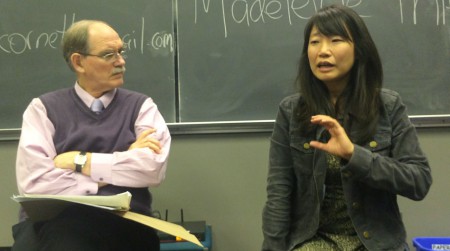Norman Cornett’s “dialogic” style of teaching made him the subject the NFB documentary Professor Norman Cornett: ‘Since when do we divorce the right answer from an honest answer?’ (trailer).
He led three dialogic sessions on writer Madeleine Thien’s work in Vancouver (at Simon Fraser University’s Harbour Centre) from April 22 to 24.
Day 3:
Thien read on the final day. In this eight-minute clip, she reads an excerpt from her novel Dogs at the Perimeter. Then Cornett read one of the participants’ reactions, including their working definition of the word ‘suffering.’
Her response included the following:
“I was trying to write letters to my mom who had passed away. But I felt that in the act of writing the letter, I was erasing her somehow because everything was from my point of view. And that, even in the act of trying to speak to her, I was actually wiping her out with the very same sentence…
“It’s interesting to think that artistic process is actually, at essence, a process of erasing.”
 Day 1:
Day 1:
There was a lot of reading and writing, in anticipation and preparation for meeting the author herself.
There were about a dozen participants, and they were asked to read examples of Thien’s writing – without knowing where they are from – then react in the form of a written word, a sentence, a paragraph, then a stream of consciousness.
Cornett would later read what was written anonymously to elicit a reaction from the author:
“What fascinates me is the interstice between … the mind of the author, the text, and the mind of the reader. And it’s in that interstice, the dialogue, the dialogic phenomenon takes place.”
Watch some video excerpts:
Before the event:
“I first met Dr. Cornett in 2008, as an observer during his dialogic session with Montreal writer Rawi Hage, and Hage’s celebrated and challenging novel Cockroach,” wrote Thien, “The class took place in an art gallery on Montreal’s Sherbrooke Street. The session I witnessed was riveting, bold, argumentative, engaged, profound, and endlessly fascinating: the kind of conversation I believe that art both provokes and necessitates.”
“The dialogic sessions revealed not only the nuances of the work, but they revealed the reader to him or herself. What do we read, how do we read it, how do we integrate it into the system of thought we carry? What parts of our thinking are invisible to us and how can we make them visible? How can we think freely? ‘We suffer no illusions that we’ll all believe the same,’ Dr. Cornett has said. ‘So that we learn that the only answer that really counts is an honest answer.’ In my encounters with Dr. Cornett since then, I’ve been consistently moved and educated by the discourse that Dr. Cornett is able to elicit in his students and in the guests who visit his class.”
“I’m honoured that Dr. Cornett has chosen to focus on my work but I know that the subject at the heart of the discourse will be the reader, the individual: our perceptions, illusions and convictions, and the struggle to think free thoughts.”
For more on Norman Cornett, here’s a YouTube video from New University Television.
Madeleine Thien’s talk “On Hastings Street,” part of Vancouver of the Mind, was published in issue 18.3 (Winter 2013) of Ricepaper magazine. Buy a copy.